Daily Vocabulary Words: List of Daily Used Words in Leading International Newspapers
Hi there. Welcome to this special section @ Wordpandit.
Our endeavour here is very simple: to highlight important daily vocabulary words, which you would come across in leading newspapers in the country. We have included the following newspapers in our selection:
• The New York Times
• The Washington Post
• Scientific American
• BBC
• The Guardian
• Psychology Today
• Wall Street Journal
• The Economist
We are putting in extensive work for developing your vocabulary. All you have got to do is be regular with this section and check out this post on a daily basis. This is your repository of words that are commonly used and essentially, we are posting a list of daily used words. Hence, this has significant practical application as it teaches you words that are used commonly in leading publications mentioned above.
Visit the website daily to learn words from leading international newspapers.
WORD-1: Unprecedented
CONTEXT: A few years ago, Americans saved a lot of money at an unprecedented speed. When the pandemic hit, household spending plummeted as people stayed home and businesses temporarily shut down. At the same time, many of those households saw a dramatic increase in income because of massive federal government spending: higher unemployment payments, universal stimulus checks, and expanded child tax credits. As a result, Americans accumulated trillions of dollars more than they were on track to save before the pandemic changed everything.
SOURCE: Vox
EXPLANATORY PARAGRAPH: Imagine you have never, ever seen a blue strawberry. If you finally see one, it’s something new and has never happened before. That’s like ‘unprecedented.’ It means something is so different and new that it has never happened in the past.
MEANING: Being without a previous example or never having occurred before (adjective).
PRONUNCIATION: un-PRES-i-den-ted
SYNONYMS: Novel, Unheard-of, Unique, Unmatched, Unparalleled
USAGE EXAMPLES:
1. The astronaut’s unprecedented journey to Mars captured everyone’s imagination.
2. We are facing an unprecedented situation during this global crisis.
3. The athlete achieved unprecedented success in the Olympics.
4. The technology company made an unprecedented profit this year.
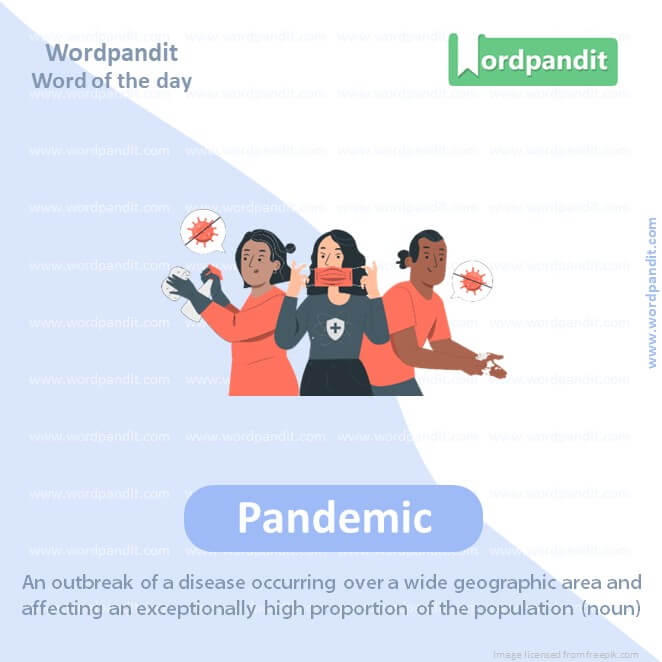
WORD-2: Pandemic
CONTEXT: A few years ago, Americans saved a lot of money at an unprecedented speed. When the pandemic hit, household spending plummeted as people stayed home and businesses temporarily shut down. At the same time, many of those households saw a dramatic increase in income because of massive federal government spending: higher unemployment payments, universal stimulus checks, and expanded child tax credits. As a result, Americans accumulated trillions of dollars more than they were on track to save before the pandemic changed everything.
SOURCE: Vox
EXPLANATORY PARAGRAPH: A pandemic is like a very big sickness that spreads to lots of people all over the world. It’s like when many of your friends in school catch the same cold.
MEANING: An outbreak of a disease occurring over a wide geographic area and affecting an exceptionally high proportion of the population (noun).
PRONUNCIATION: pan-DEM-ik
SYNONYMS: Epidemic, Widespread, Global, Universal, Rampant
USAGE EXAMPLES:
1. Schools were closed during the pandemic to keep everyone safe.
2. Doctors and nurses worked very hard during the pandemic.
3. People wore masks to protect themselves during the pandemic.
4. The pandemic affected travel and business all around the world.
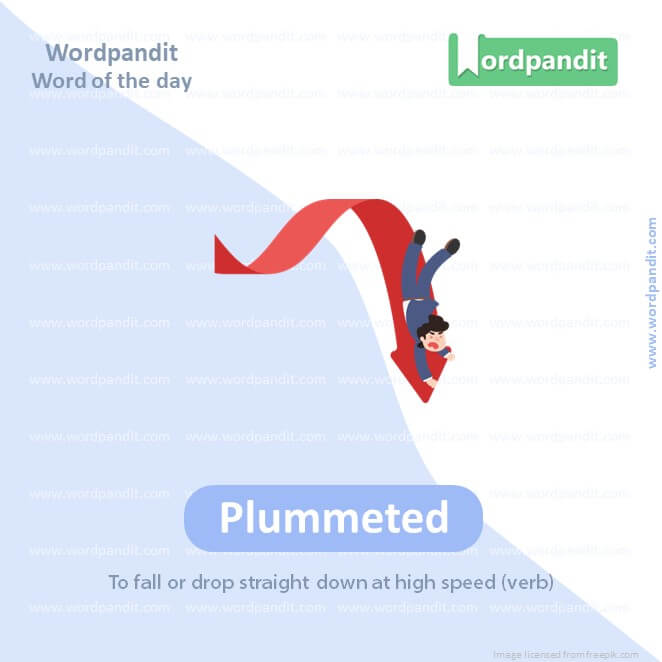
WORD-3: Plummeted
CONTEXT: A few years ago, Americans saved a lot of money at an unprecedented speed. When the pandemic hit, household spending plummeted as people stayed home and businesses temporarily shut down. At the same time, many of those households saw a dramatic increase in income because of massive federal government spending: higher unemployment payments, universal stimulus checks, and expanded child tax credits. As a result, Americans accumulated trillions of dollars more than they were on track to save before the pandemic changed everything.
SOURCE: Vox
EXPLANATORY PARAGRAPH: Think about a toy airplane suddenly falling down from the sky very fast. When something plummets, it drops down really quickly, like the toy airplane.
MEANING: To fall or drop straight down at high speed (verb).
PRONUNCIATION: PLUM-it-ed
SYNONYMS: Plunge, Drop, Fall, Dive, Tumble
USAGE EXAMPLES:
1. The temperature plummeted overnight, and it was really cold in the morning.
2. The stock market prices plummeted after the news.
3. The bird plummeted down to catch its food.
4. His spirits plummeted when he heard the sad news.
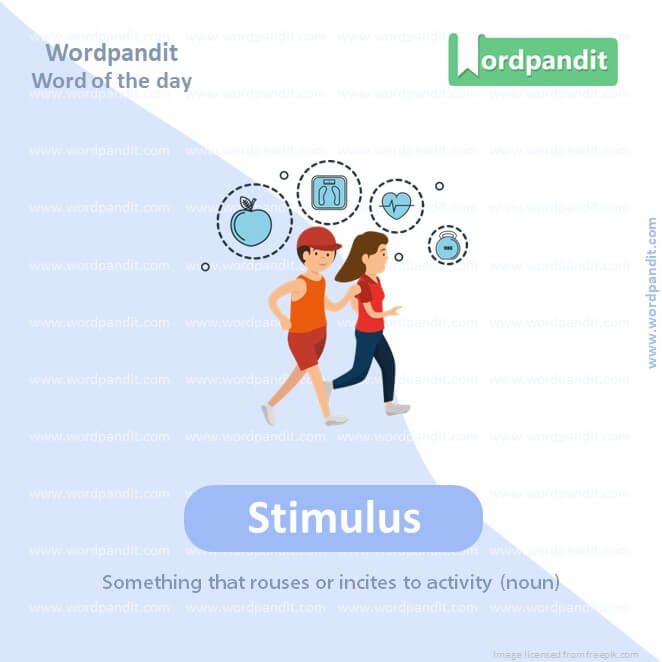
WORD-4: Stimulus
CONTEXT: A few years ago, Americans saved a lot of money at an unprecedented speed. When the pandemic hit, household spending plummeted as people stayed home and businesses temporarily shut down. At the same time, many of those households saw a dramatic increase in income because of massive federal government spending: higher unemployment payments, universal stimulus checks, and expanded child tax credits. As a result, Americans accumulated trillions of dollars more than they were on track to save before the pandemic changed everything.
SOURCE: Vox
EXPLANATORY PARAGRAPH: Stimulus is like when you get a small push or help to do something. Like when your mom gives you a little nudge to start cleaning your room.
MEANING: Something that rouses or incites to activity (noun).
PRONUNCIATION: STIM-yoo-lus
SYNONYMS: Motivation, Incentive, Impetus, Provocation, Spur
USAGE EXAMPLES:
1. The government provided a financial stimulus to boost the economy.
2. The bright colors in the painting are a stimulus for creativity.
3. A good story can be a stimulus for imagination.
4. Exercise can be a great stimulus for a healthy lifestyle.
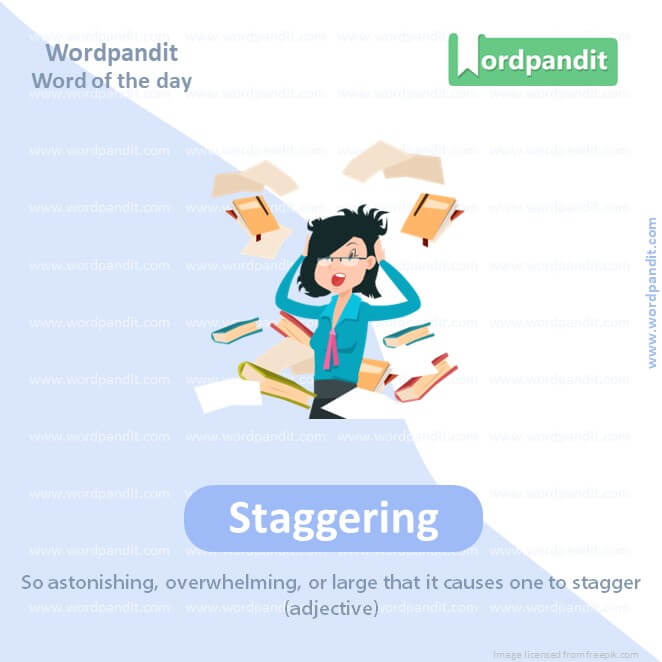
WORD-5: Staggering
CONTEXT: But that didn’t last long. As Covid-era restrictions eased and government assistance programs dried up, Americans also started facing a staggering rise in prices. That prompted the Federal Reserve to raise interest rates in an attempt to cool the economy, and fears of a recession started to set in. But contrary to what many economists predicted, Americans were undeterred by those headwinds: Month after month, they kept spending money — a lot of it.
SOURCE: Vox
EXPLANATORY PARAGRAPH: Imagine you see a huge pile of candy, so much that it’s hard to believe! Staggering is when something is so surprising or big that it almost makes you feel like you can’t stand up straight.
MEANING: So astonishing, overwhelming, or large that it causes one to stagger (adjective).
PRONUNCIATION: STAG-er-ing
SYNONYMS: Astonishing, Overwhelming, Amazement, Astounding, Breathtaking
USAGE EXAMPLES:
1. The amount of people who came to the concert was staggering.
2. The staggering beauty of the mountains left them in awe.
3. The cost of the project was staggering.
4. His knowledge on the subject is staggering.
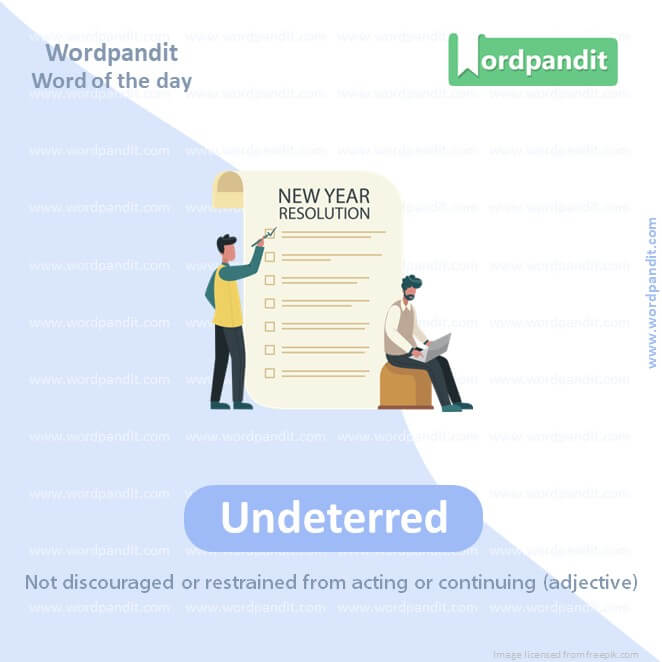
WORD-6: Undeterred
CONTEXT: But that didn’t last long. As Covid-era restrictions eased and government assistance programs dried up, Americans also started facing a staggering rise in prices. That prompted the Federal Reserve to raise interest rates in an attempt to cool the economy, and fears of a recession started to set in. But contrary to what many economists predicted, Americans were undeterred by those headwinds: Month after month, they kept spending money — a lot of it.
SOURCE: Vox
EXPLANATORY PARAGRAPH: Imagine you’re building a big tower of blocks, and it keeps falling down. But you don’t give up; you keep trying. That’s being undeterred – you keep going even when things are hard.
MEANING: Not discouraged or restrained from acting or continuing (adjective).
PRONUNCIATION: un-de-TERD
SYNONYMS: Unwavering, Resolute, Persistent, Unflinching, Steadfast
USAGE EXAMPLES:
1. She was undeterred by the challenges and continued her research.
2. The team remained undeterred despite the bad weather.
3. His passion for music was undeterred by the lack of support.
4. Undeterred by the failure, he tried again.
WORD-7: Grim
CONTEXT: Since then, there has been a lot of good news about the economy in the United States: It’s growing at a faster rate than in other wealthy countries, the labor market is staying stubbornly strong, and inflation is well below its peak. Yet despite those encouraging stats — which have led many economists to walk back their grim predictions of a recession — there have been many headlines over the past year suggesting that it’s all a mirage.
SOURCE: Vox
EXPLANATORY PARAGRAPH: Grim is like when something is very serious and maybe a bit scary, like the face your teacher makes when she’s really not happy.
MEANING: Harsh, forbidding, or morose (adjective).
PRONUNCIATION: GRIM
SYNONYMS: Bleak, Dire, Dismal, Somber, Stern
USAGE EXAMPLES:
1. The news about the accident was grim.
2. He had a grim expression when he heard about the loss.
3. The future looked grim without any solution.
4. The weather was grim with dark clouds and strong winds.
WORD-8: Mirage
CONTEXT: Since then, there has been a lot of good news about the economy in the United States: It’s growing at a faster rate than in other wealthy countries, the labor market is staying stubbornly strong, and inflation is well below its peak. Yet despite those encouraging stats — which have led many economists to walk back their grim predictions of a recession — there have been many headlines over the past year suggesting that it’s all a mirage.
SOURCE: Vox
EXPLANATORY PARAGRAPH: Imagine walking in a hot desert and thinking you see water, but when you get closer, there’s no water. That’s a mirage, something that looks real but isn’t.
MEANING: An optical illusion caused by atmospheric conditions, especially the appearance of a sheet of water in a desert or on a hot road caused by the refraction of light from the sky (noun).
PRONUNCIATION: mi-RAHZH
SYNONYMS: Illusion, Hallucination, Apparition, Delusion, Phantasm
USAGE EXAMPLES:
1. In the hot desert, the traveler was tricked by a mirage.
2. The oasis turned out to be just a mirage.
3. He chased a mirage of happiness that was never real.
4. The mirage made them think there was water ahead.
WORD-9: Turbulence
CONTEXT: There was a time when inflation was so high that many economists argued it would only come down fast enough if the Fed deliberately crashed the economy. Optimistic analysts, though, kept arguing that the economic turbulence could end with a so-called “soft landing” — a return to normal without a recession. Now, it seems that outcome is more likely, and a big reason why is that consumer spending remained strong, even if it slowed down in recent months.
SOURCE: Vox
EXPLANATORY PARAGRAPH: Turbulence is like when you’re on a plane, and it starts shaking because of the air outside. It’s not smooth and can be a bit scary, like riding a very bumpy road.
MEANING: A state of confusion, violence, or disorder (noun).
PRONUNCIATION: TUR-byoo-lens
SYNONYMS: Disorder, Unrest, Chaos, Upheaval, Agitation
USAGE EXAMPLES:
1. The airplane experienced turbulence during the flight.
2. The country went through political turbulence.
3. The markets are in a state of financial turbulence.
4. The sea was rough, causing turbulence in the boat.
WORD-10: Recession
CONTEXT: There was a time when inflation was so high that many economists argued it would only come down fast enough if the Fed deliberately crashed the economy. Optimistic analysts, though, kept arguing that the economic turbulence could end with a so-called “soft landing” — a return to normal without a recession. Now, it seems that outcome is more likely, and a big reason why is that consumer spending remained strong, even if it slowed down in recent months.
SOURCE: Vox
EXPLANATORY PARAGRAPH: Think of a time when you had fewer toys to play with than before. Recession is like that, but for a country’s money. It means there’s less money and business going around than there used to be.
MEANING: A period of temporary economic decline during which trade and industrial activity are reduced (noun).
PRONUNCIATION: re-SESH-un
SYNONYMS: Downturn, Slump, Decline, Slowdown, Contraction
USAGE EXAMPLES:
1. Many people lost their jobs during the recession.
2. The government took steps to recover from the recession.
3. The recession affected many businesses.
4. Economists predicted the onset of a recession.
Vocabulary Spelling
In the rich tapestry of language learning, getting the ‘vocabulary spelling’ right forms a significant thread. These spelled words or the arrangement of letters give each word its unique identity. However, understanding ‘vocabulary spelling’ proficiently needs an insightful and strategic approach.
Starting the journey of learning ‘vocabulary spelling’, one must focus on observing patterns. English language words often follow certain spelling rules or patterns. Recognizing these can simplify the learning process, offering a systematic way to appreciate ‘vocabulary spelling’.
The trick to ingraining ‘vocabulary spelling’ effectively lies in the power of repetition. Regularly writing words can help reinforce the spelling in your memory. To boost this, tools like spelling quizzes or flashcards with the word on one side and the spelling on the other can provide an engaging way to practice ‘vocabulary spelling’.
An unconventional yet powerful approach to remember ‘vocabulary spelling’ is by using mnemonic devices. For instance, connecting the word’s spelling with a catchy phrase or rhyming pattern can make recall easier.
Integrating technology with learning ‘vocabulary spelling’ has its unique benefits, too. Apps offer various exercises and tests that not only enhance memory but also make learning fun.
Importantly, the learning of ‘vocabulary spelling’ should be punctuated with regular revisions. This ensures the recalled spelling is correct and cements it in your long-term memory.
In a nutshell, mastering ‘vocabulary spelling’ requires keen observation, regular practice, innovative mnemonic tools, use of technology, and timely revisions. As you follow this comprehensive path, you strengthen your grasp over ‘vocabulary spelling’, paving the way to language proficiency. Remember, every word spelled correctly is a moment of triumph in the enthralling escapade of language learning!













